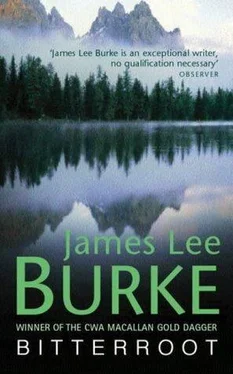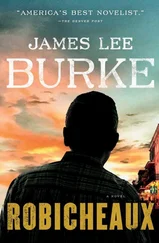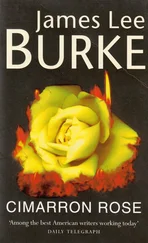"'Terry? You're on a first-name basis with this ass-wipe?" I said. She was sitting on the porch step with a book splayed open on her knee. Her calico cat was flipping in the dust by her feet. She squinted her eyes at me in the sunlight.
"That's his name, isn't it?" she said.
"Don't let that guy get near you, Maisey."
"I wish you wouldn't tell me what to do."
"Don't any of you kids have any judgment about the people you associate with?" I asked.
"Your problem is with Lucas, Billy Bob, not me. Please change your tone of voice."
There's no feeling quite like being corrected by a sixteen-year-old girl.
I drove back down the Blackfoot and into East Missoula, a community of trailers and truckstops and low-rent casinos, where the poor and unskilled watched the world they had taken for granted disappear around them. It Wasn't hard to find the junkyard where Sue Lynn lived. Cars that had been crushed and flattened by a compactor were stacked in layers on a knoll above the highway, and the windowless gray-primed stock car she drove, with orange numerals on the doors, was parked by an old brick cottage with a sign over the porch that read Salvage.
Sue Lynn and Lucas were on their hands and knees in the backyard, working on what I thought was a rock garden. Then I realized the design was far more intricate. They had laid out a circle of stones, with two intersecting lines inside it. One line of stones was painted red, the other black. In the middle of the cross was a willow tree.
Now Lucas and Sue Lynn were working each of the quadrants with trowels and sprinkling them down with a water can and planting purple and white and pink pansies into the mixture of mulch and black soil. The mongrel dog Lucas had saved from drowning in the Blackfoot River was nosing his snout into the dirt, his tail wagging, his hair matted down with the medicine Lucas had smeared on his mange.
I squatted on my haunches outside the circle of stones and took off my hat and put a peppermint stick in the corner of my mouth. "It looks real good," I said.
"It's an Indian prayer garden. The willow is the Tree of Life. One part of the cross is the red road. That's the good way in this world. The other one, the black road, that one's not so cool," Lucas said.
"Wyatt Dixon said you pulled a knife on him."
"He's full of shit. I took out a pocketknife to peel an apple and he made some kind of wise-ass remark about it," Lucas replied. "Why's he want to think I'd pull a knife?"
"So he can kill you, son." I felt my gaze break at the content of my own words. I also realized I'd never called Lucas son before.
"Maybe he'll get a surprise," Lucas said.
"Don't talk that way," I said.
"Should I leave?" Sue Lynn said.
"How are you, Sue Lynn?" I said.
She pressed the roots of a petunia into the damp soil and didn't answer. She wore cutoff jeans and a halter, and the tips of her hair were wet with perspiration and there were sun freckles on the tops of her breasts.
"Who owns this place?" I asked.
"My uncle. He did time in Marion," she replied.
"As joints go, that's real mainline."
"I told you once before I don't get to choose where I live."
"You ever read Black Elk Speaks by John Neihardt?" I asked.
"I never heard of it," she replied.
"You should. This prayer garden is in his book."
"My grandfather was a Crow holy man and you're an asshole, Mr. Holland," she said.
"Come on, Sue Lynn," Lucas said.
I got to my feet and put my hat back on. The hills across the river were velvet green and rose abruptly into the sky and ponderosa pine flowed from the crests down into the arroyos.
"My apologies to you, Ms. Big Medicine. Y'all have a fine day," I said, and walked back to my truck.
I saw Lucas running to catch me before I got out on the highway. I winked at him and gave him the thumbs-up sign.
That night Lucas played at the Milltown Bar. The tables and dance floor were filled, the crowd happy and drunk and raucous. When Lucas came to the microphone to sing his first song of the evening, his eyes were watering from the cigarette smoke and the heat of the stage lights that shone upward into his face. He clicked the floor switch with his boot and the banks of white lights died and cooled, and he clicked a second switch and four overhead flood lamps wrapped with tinted cellophane came on and bathed the stage with a soft reddish-blue glow.
He blotted the sweat out of his eyes and the room came into focus, then he looked down into a face that made him twitch inside.
"During your break I'd like to compare notes with you on Sue Lynn. She can really rise to the occasion if you can get down past that wore-out part," Wyatt Dixon said.
The next evening Doc and I attended a town meeting hosted by the Phillips-Carruthers Corporation at the Holiday Inn in Missoula. The crowd was a hostile one. Things had not been going well for Phillips-Carruthers. The previous day a famous female country singer had agreed to visit the mine site. Perhaps because of the fact she chain-smoked cigarettes and looked as if she had just been blown through the doors of a beer joint, the mine operators thought they had a sympathetic vehicle for their message. Also, like most greedy and obtuse people, they believed news media existed for no other purpose than to promote their business interests. Hence, they arranged for both print and television journalists to be at the mine site when the singer was escorted from a company helicopter to the water processing shed that supposedly neutralized any contaminants that might leak into the ecosystem.
On camera, a smiling company executive filled a drinking glass from a tap and offered it to the singer.
"It's as clear as spring water, ma'am. I'd give it to my grandchildren," he said.
"Thank you, sir. But I don't care to have nuclear-strength spinach growing out of my lungs," she replied, and smiled sweetly at him.
Probably due to the influence of a PR person with a brain, tonight the mine operators played over the heads of the audience and made use of their hostility. There was no shortage of fanatics and professional naysayers in the crowd, people who wore their eccentricity like a uniform and loved conflict and acrimony so they would not have to contemplate the paucity of significance in their own lives. The mine operators paraded working people in front of the microphone, both men and women who spoke sincerely about their dependence upon the mine for their homes and livelihoods. You could almost feel the mine executives praying under their breaths for a catcall from the audience.
But it didn't happen. The audience was respectful, the occasional dissenting moan in a listener hushed by those around him. Then Carl Hinkel, the militia leader from the Bitterroot Valley, rose from his chair in the third row and gave the mine operators what they needed, a dignified presentation that belied his agenda, that mixed patriotism and blue-collar attitudes with positive economic statistics and Montana traditions.
He wore a western-cut sports coat with pads on the elbows and a maroon shirt and a flowered tie and charcoal slacks. His beard was freshly clipped, his shoulders straight, his corncob pipe cupped in his palm. His Tidewater accent, empty of anger or malicious intent, was both foreign and intriguing to the audience. Their faces seemed to be reconsidering all the impressions they had previously formed about him.
"You're not going to spike this guy's cannon?" I said to Doc.
But Doc just looked at his feet.
"The Earth was put here for a purpose, to nurture and sustain us. The minerals we take from the ground are like the vegetables we grow on our farms. They're all gifts of the Lord," Hinkel said. "It seems to me a terrible arrogance to reject that gift. I don't mean to offend anyone here. I love this state. I think it's our charge to be good stewards of the land. I appreciate the opportunity you've given me to speak here tonight. God bless every one of you, and God bless these working folks who need their jobs."
Читать дальше












